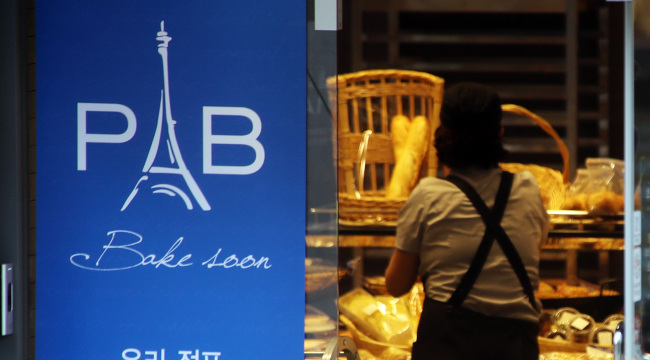Korean firm ordered to directly hire over 5,000 bakers
By Ock Hyun-juPublished : Sept. 21, 2017 - 21:14
The government on Thursday ordered Paris Baguette, a leading bakery brand of food giant SPC Group, to directly hire nearly 5,400 bakers currently dispatched by its partner firms.
The Ministry of Employment and Labor concluded that Paris Baguette directly supervised jobs of the bakers employed and dispatched by partner firms, constituting illegal dispatch of workers under the local labor law.
The Ministry of Employment and Labor concluded that Paris Baguette directly supervised jobs of the bakers employed and dispatched by partner firms, constituting illegal dispatch of workers under the local labor law.

The ministry ordered Paris Baguette to directly hire all of the 5,378 bakers who are working at its 3,396 franchise stores. Noncompliance would lead to a legal punishment or fine, it said.
The decision came after an on-site inspection at 68 locations, including the Paris Baguette headquarters, partner firms and chain stores.
The 11 partner firms, who sent the bakers to Paris Baguette stores, are run by retirees from the bakery chain. Their only business is to manage bakers for Paris Baguette stores, the ministry said.
The ministry also found wage arrears amounting to 11.1 billion won.
It is not illegal for franchise store owners to outsource baking and have bakers, employed by personnel management firms, do the work at their stores. But it is illegal, if the bakers receive a direct order from the owners or headquarters.
Paris Baguette expressed disappointment over the decision, saying it was not a “direct supervision” but only a part of its efforts to support its franchise store owners.
“The Paris Baguette head office has duty to support and advise franchise store owners. As they asked for help in looking for and hiring bakers, the head office only matched bakers with the store owners,” an official from Paris Baguette told The Korea Herald.
The illegal dispatch is considered a way for conglomerates to cut back on labor costs. The workers dispatched by partner firms or recruitment agencies, categorized as “irregular workers,” do not receive the same benefits and income as regular workers, though they often do the same job. The practice is illegal, except in certain sectors such as security and cleaning.
By Ock Hyun-ju (laeticia.ock@heraldcorp.com)
Staff reporter Won Ho-jung contributed to this report.
-
Articles by Ock Hyun-ju



![[Exclusive] Korean military set to ban iPhones over 'security' concerns](http://res.heraldm.com/phpwas/restmb_idxmake.php?idx=644&simg=/content/image/2024/04/23/20240423050599_0.jpg&u=20240423183955)




![[Herald Interview] 'Amid aging population, Korea to invite more young professionals from overseas'](http://res.heraldm.com/phpwas/restmb_idxmake.php?idx=644&simg=/content/image/2024/04/24/20240424050844_0.jpg&u=20240424200058)

![[Pressure points] Leggings in public: Fashion statement or social faux pas?](http://res.heraldm.com/phpwas/restmb_idxmake.php?idx=644&simg=/content/image/2024/04/23/20240423050669_0.jpg&u=)









